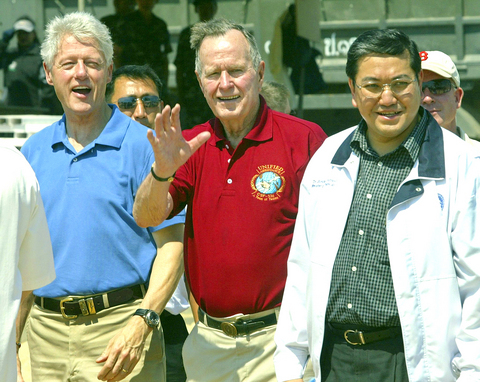Former US presidents Bill Clinton and George Bush toured parts of southern Thailand yesterday on the first stop of their tour of Asian nations hit by December's catastrophic tsunamis.
Meanwhile, foreign aid workers helping tsunami relief efforts in Indonesia could be the target of terrorist attacks, Canberra warned in a travel advisory yesterday.

PHOTO: EPA
Australian Foreign Minister Alexander Downer said his country had received intelligence its nationals could come under fire in Aceh and Northern Sumatra.
"New information [has been] received by the government concerning possible terrorist planning for attacks against foreigners involved in relief efforts in Aceh or other areas of northern Sumatra," Downer said in a statement.
"The government is working closely with Indonesian authorities and other governments involved in the relief effort to address this new threat information.
"The government is keeping the security situation in Aceh under close review and new information will be brought to the attention of the public through my department's travel advice."
The official advice said Australians should only travel to Aceh to help the post-tsunami relief effort if they were working with a recognised aid organization which had coordinated security with Indonesian authorities.
It said Australians not involved in the relief effort should leave the region.
Australia has about 1,000 military personnel and numerous civilians involved in the massive aid effort
The Australian military are unarmed and rely on their Indonesian counterparts for protection.
The former US leaders touched down shortly after noon at Phuket and were greeted by Thai Foreign Minister Surakiart Sathirathai.
They then traveled to the devastated fishing village of Baan Nam Khem to assess reconstruction efforts in Thailand's hardest-hit province of Phang Nga.
Clinton and Bush, appointed by US President George W. Bush to head private fundraising efforts following the tsunami, are also set to visit Indonesia, Sri Lanka and the Maldives from today.
Nearly 5,400 people were killed in Thailand when the giant waves struck on Dec. 26. Roughly half of the dead are believed to be foreign tourists who were spending holidays on the country's famous beaches.
Some 3,000 people are still missing, and thousands more lost their homes and livelihoods.
A massive international forensics operation is still underway in southern Thailand to identify all of the dead.
Bush and Clinton were to pay their respects for the victims during a ceremony later yesterday, and to meet with Thai Prime Minister Thaksin Shinawatra.
Clinton, a Democrat who defeated the elder Bush in 1992 elections and was succeeded by the Republican's son eight years later, has been named the UN's special envoy for tsunami relief.
The White House has placed former President Bush in charge of efforts to raise private US aid for nations devastated by the tsunami that ripped through the Indian Ocean, killing nearly 289,000 people, most of them in Indonesia.
Clinton and Bush regularly appear in television advertisements requesting donations for the hundreds of thousands made homeless by the tsunamis, which were triggered by a massive undersea earthquake off the coast of Sumatra.

Auschwitz survivor Eva Schloss, the stepsister of teenage diarist Anne Frank and a tireless educator about the horrors of the Holocaust, has died. She was 96. The Anne Frank Trust UK, of which Schloss was honorary president, said she died on Saturday in London, where she lived. Britain’s King Charles III said he was “privileged and proud” to have known Schloss, who cofounded the charitable trust to help young people challenge prejudice. “The horrors that she endured as a young woman are impossible to comprehend and yet she devoted the rest of her life to overcoming hatred and prejudice, promoting kindness, courage, understanding

Tens of thousands of Filipino Catholics yesterday twirled white cloths and chanted “Viva, viva,” as a centuries-old statue of Jesus Christ was paraded through the streets of Manila in the nation’s biggest annual religious event. The day-long procession began before dawn, with barefoot volunteers pulling the heavy carriage through narrow streets where the devout waited in hopes of touching the icon, believed to hold miraculous powers. Thousands of police were deployed to manage crowds that officials believe could number in the millions by the time the statue reaches its home in central Manila’s Quiapo church around midnight. More than 800 people had sought

‘DISRESPECTFUL’: Katie Miller, the wife of Trump’s most influential adviser, drew ire by posting an image of Greenland in the colors of the US flag, captioning it ‘SOON’ US President Donald Trump on Sunday doubled down on his claim that Greenland should become part of the US, despite calls by the Danish prime minister to stop “threatening” the territory. Washington’s military intervention in Venezuela has reignited fears for Greenland, which Trump has repeatedly said he wants to annex, given its strategic location in the arctic. While aboard Air Force One en route to Washington, Trump reiterated the goal. “We need Greenland from the standpoint of national security, and Denmark is not going to be able to do it,” he said in response to a reporter’s question. “We’ll worry about Greenland in

PERILOUS JOURNEY: Over just a matter of days last month, about 1,600 Afghans who were at risk of perishing due to the cold weather were rescued in the mountains Habibullah set off from his home in western Afghanistan determined to find work in Iran, only for the 15-year-old to freeze to death while walking across the mountainous frontier. “He was forced to go, to bring food for the family,” his mother, Mah Jan, said at her mud home in Ghunjan village. “We have no food to eat, we have no clothes to wear. The house in which I live has no electricity, no water. I have no proper window, nothing to burn for heating,” she added, clutching a photograph of her son. Habibullah was one of at least 18 migrants who died